-
When State Rep. Nathan Reitz (D-Steeleville) was sworn into the Illinois House last month, negotiations for an omnibus gaming expansion bill were well on their way in Springfield — a bill that would ultimately include six new licenses for areas in the state that have long clamored for their own casinos.
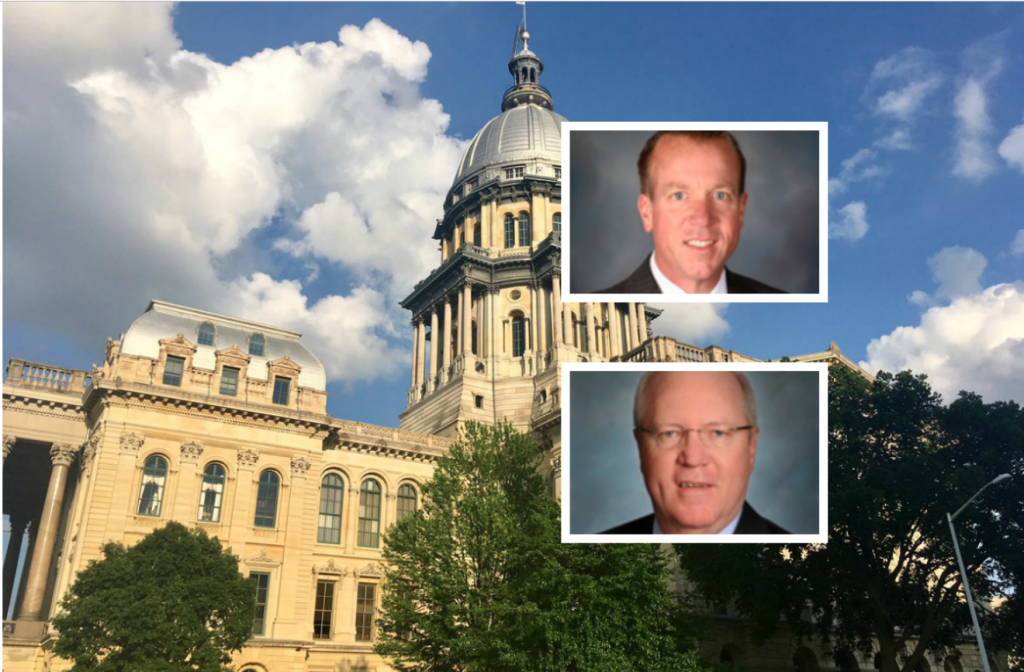 State Rep. Nathan Reitz, top, voted for the bill his father, former State Rep. Dan Reitz lobbied for. [Hannah Meisel/The Daily Line; Submitted]
State Rep. Nathan Reitz, top, voted for the bill his father, former State Rep. Dan Reitz lobbied for. [Hannah Meisel/The Daily Line; Submitted]
Helping make the pipedream for a casino in Southern Illinois a reality this spring session was Dan Reitz, a former legislator, current lobbyist and the state representative’s father.
The younger Reitz voted for the bill.
-
Some state employees will be paid out of a fund that accepts both public and private dollars under a change to state law included in the budget implementation bill passed by the General Assembly during overtime session last weekend and signed by Gov. JB Pritzker last week.
-
Comptroller Susana Mendoza stayed out of sight this spring after finishing fifth in the race for the mayor in February. After the loss, Mendoza went back to work in Springfield, since she won a full four-year term in November — about a week before she announced her bid for mayor. During her first term as comptroller, Mendoza was a constant critic of Republican Gov, Bruce Rauner and Republicans as the state’s budget impasse wore on for two years. Since her loss in February, Mendoza says she’s been visiting safety net hospitals and healthcare providers around the state that have been impacted by high rates of denials from Medicaid Managed Care organizations — a cause Mendoza has been fighting since she entered office. At the height of the 736-day budget impasse, the state’s backlog of bills reached nearly $17 billion. As of Wednesday, that number is down to $6.15 billion — including $520 million worth of healthcare bills paid Tuesday. The Daily Line spoke with Mendoza Wednesday for a lengthy interview, part one of which ran in Thursday’s newsletter.
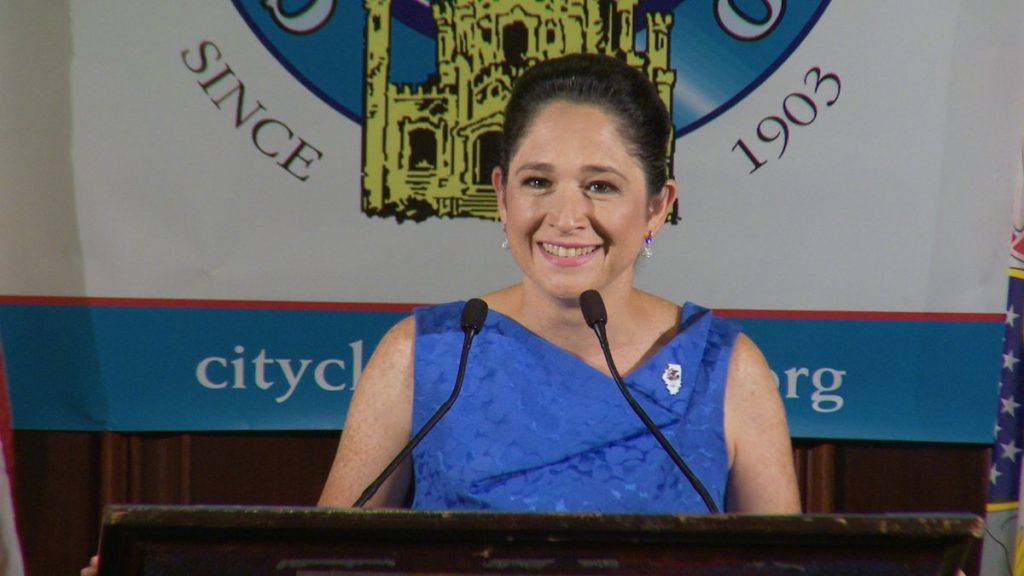 Illinois Comptroller Susana Mendoza [City Club of Chicago]
Illinois Comptroller Susana Mendoza [City Club of Chicago]
-
Comptroller Susana Mendoza stayed out of sight this spring after finishing fifth in the race for the mayor in February. After the loss, Mendoza went back to work in Springfield, since she won a full four-year term in November — about a week before she announced her bid for mayor. During her first term as comptroller, Mendoza was a constant critic of Republican Gov, Bruce Rauner and Republicans as the state’s budget impasse wore on for two years. Since her loss in February, Mendoza says she’s been visiting safety net hospitals and healthcare providers around the state that have been impacted by high rates of denials from Medicaid Managed Care organizations — a cause Mendoza has been fighting since she entered office. At the height of the 736-day budget impasse, the state’s backlog of bills reached nearly $17 billion. As of Wednesday, that number is down to $6.15 billion — including $520 million worth of healthcare bills paid Tuesday. The Daily Line spoke with Mendoza Wednesday for a lengthy interview, part two of which will run in Friday’s newsletter.
 Illinois Comptroller Susana Mendoza [City Club of Chicago]
Illinois Comptroller Susana Mendoza [City Club of Chicago]
-
Rookie Gov. JB Pritzker on Wednesday signed bills approving the state’s operating budget and revenues, along with the rates for a graduated income tax, should voters approve the tax on the November 2020 ballot.
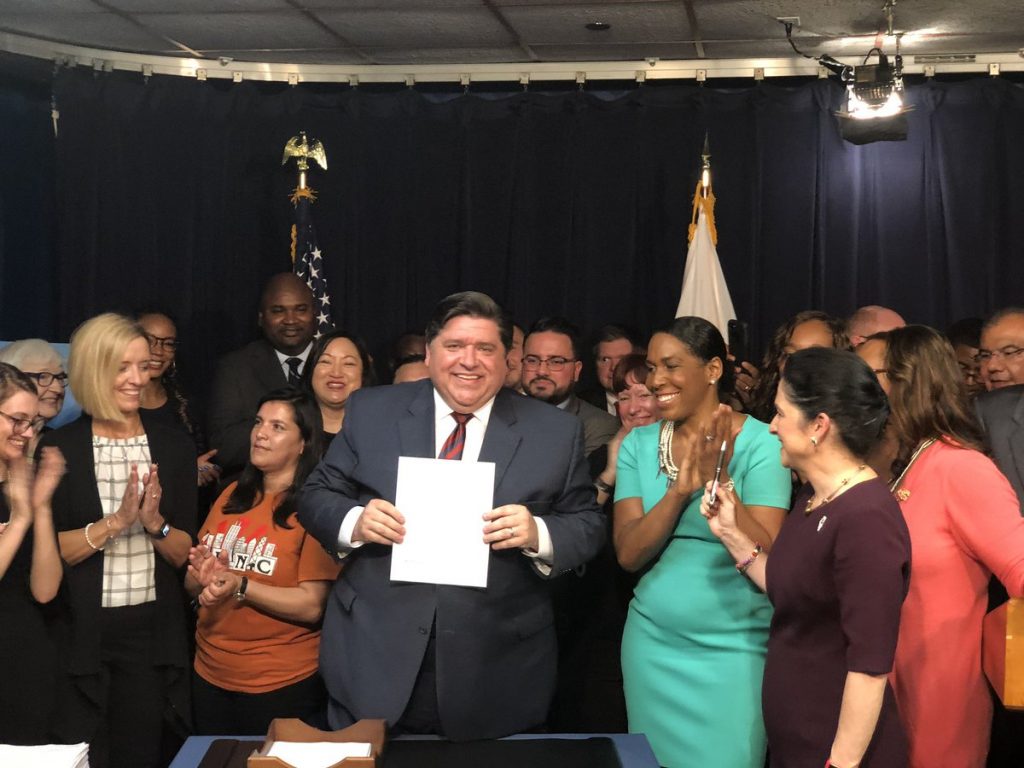 Gov. JB Pritzker celebrates the signing of the budget. [Governor's Office]
Gov. JB Pritzker celebrates the signing of the budget. [Governor's Office]
-
Illinois Department of Revenue Director David Harris was one of the small group of Republican legislators who defied former Gov. Bruce Rauner in the summer of 2017 when he not only voted for a tax hike to end a two-year budget impasse, but also voted to overturn the Republican governor’s veto on the increase in income taxes. While he and many others announced their immediate retirements after that vote or their decisions to not seek re-election, Gov. JB Pritzker announced Harris would serve as the director IDOR soon after his November win over Rauner. The Daily Line spoke with Harris on Tuesday two days after the legislature wrapped up its business for the spring session, which resulted in the legalization of recreational marijuana, a $40.1 billion budget, a $44.5 billion six-year capital plan and a host of new taxes and fees in exchange for the creation of a bevy of new tax incentives for businesses.
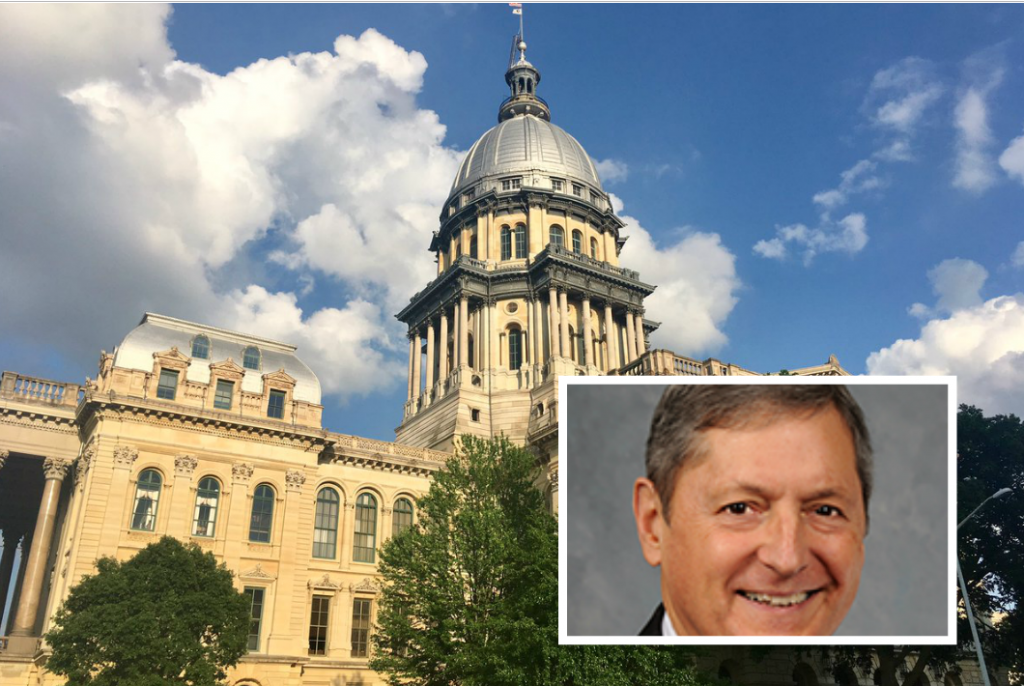 Illinois Department of Revenue Director David Harris. [Submitted]
Illinois Department of Revenue Director David Harris. [Submitted]
-
A man plays a video slot machine in a lounge at Huck’s, a truck stop in Mt. Vernon, Illinois. Under Illinois’ new gambling expansion, bars, restaurants, fraternal organizations and gambling parlors will be allowed to have six machines, up from five. Trucks stops will be permitted to hold 10 machines. (Whitney Curtis, special to ProPublica Illinois)
An 816-page bill introduced and passed by the General Assembly over the weekend will, if fully realized, transform Illinois into the gambling capital of the Midwest.
The legislation legalizes sports gambling; sanctions six new casinos, including one in Chicago; increases the number of video gambling machines as well as the maximum bet; and transforms the state’s horse racing tracks into “racinos” by permitting casino operations at the state’s three existing tracks while allowing two more to open. -
Shortly after the Senate adjourned for the spring early Sunday evening, aides decked out Gov. JB Pritzker’s office with giant multi-colored signs touting their accomplishments: legalizing marijuana, putting the question of a graduated income tax on the November 2020 ballot, a $15 minimum wage and passing the Reproductive Health Act.
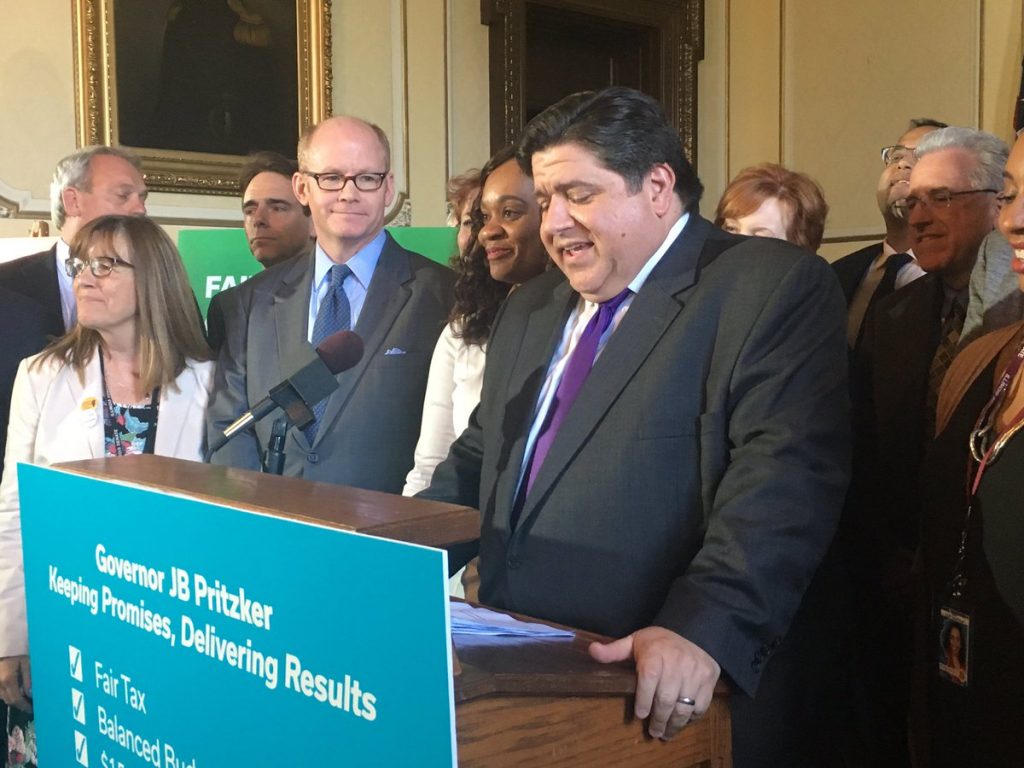 “They said it couldn’t be done,” Gov. JB Pritzker said. [Hannah Meisel/The Daily Line]
“They said it couldn’t be done,” Gov. JB Pritzker said. [Hannah Meisel/The Daily Line]
But when Pritzker and other Democratic senators filed into the room to talk to reporters, he was accompanied by GOP senators as well as including Senate Minority Leader Bill Brady (R-Bloomington).
-
After an hours-long break in legislative floor action Friday afternoon and evening, the Illinois House passed an operating budget worth $40.1 billion — nearly $1.5 billion larger than the budget Gov. JB Pritzker proposed in February.
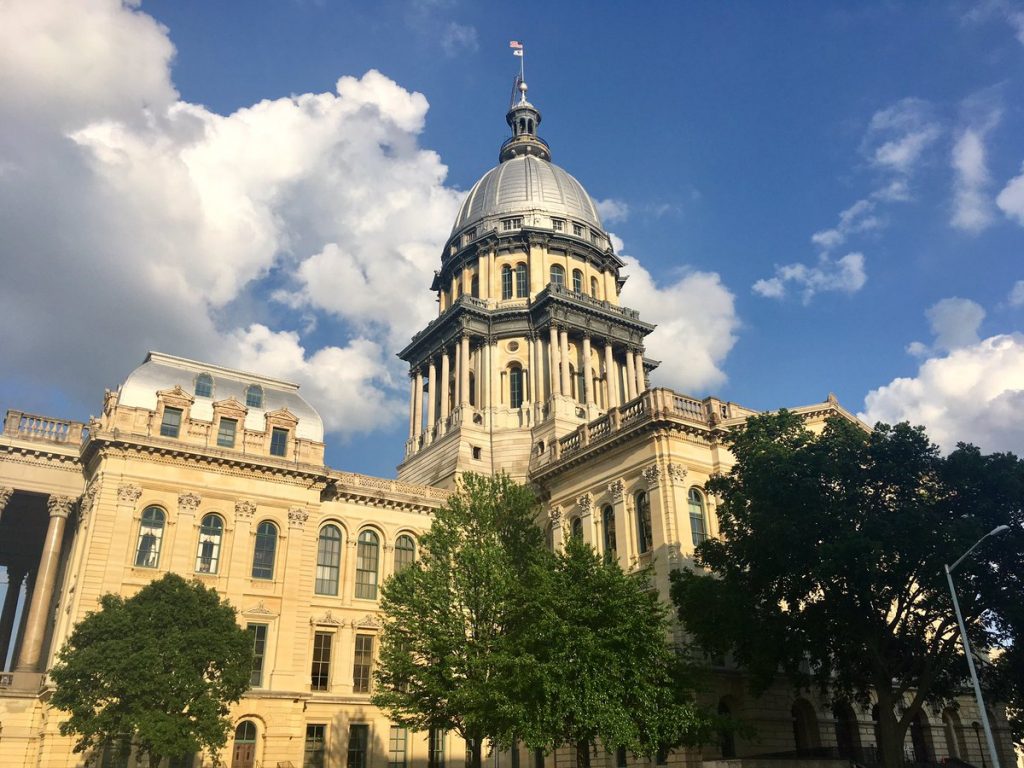 The Illinois State Capitol. [Hannah Meisel/The Daily Line]
The Illinois State Capitol. [Hannah Meisel/The Daily Line]
-
Ahead of a Friday vote on a bill that would require firms to pay their workers the equivalent of the local prevailing wage paid to union laborers, the business community balked at new language filed in a trailer bill that would exempt operators with a project labor agreement with a local union.
Do you like this page?












